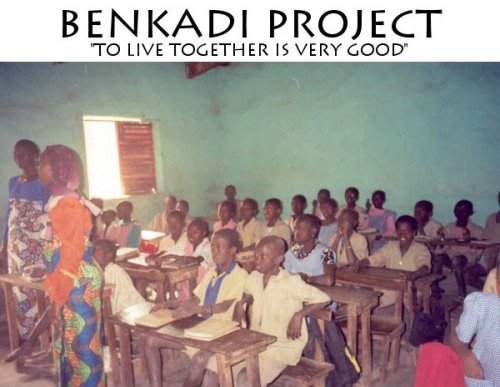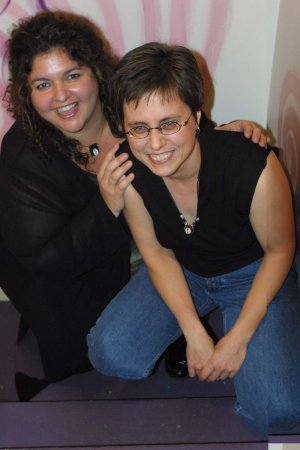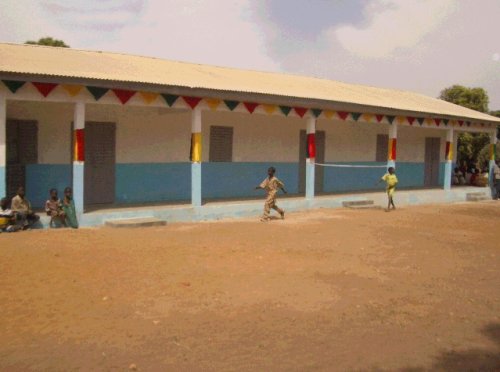
Videos about us. The first one tells the story of how we started when Helen Bond traveled to Guinea December 2001 and Amy Lusk January 2002! The next two are about our new Universal Peanut Sheller Project USN addressing Food Security issues. Others are of our deployment and implementation of the biosand water filter project. Providing clean water for families in Guinea.
To see photos of our Motherland Rhythm Community Benkadi Projects and milestones over the past fifteen years click here to go to Facebook and Like US!
Click here to download the Benkadi Donation Card
Highlight of our efforts over the past 23 years
We continue to fabricate and deliver BioSand Water filters. Todate with the bore-dug wells and BioSand Water filters (we have delivered.) We estimate that over 80,000 people now have access to Clean water as of the end of 2023. Expanded the BioSand Water filter site. 2020-present Another well was dug in Sangbaralla Village in 2022. Toilet House constructed next to the Youth Center 2020. Construction of the Women's Market with toilet house in Sangbaralla Village near Kouroussa was completed 2020. Dug a well in upper area of Cimenterie providing water for all the locals 2020. Provided families with food support during Covid Lockdown 2020. Continued construction of BioSand Water Filters in our two locations and pilot BioSand Water Filters in Sangbaralla Village. Improving security of our BiosSand Water Filter production site in Debreka 2018.
Ongoing work to fabricate BioSand Water filters in Debreka and expand construction of the UNS in Sangbaralla village. Completion of construction of our main home site in 2017. Completion of Youth Center in Sangbaralla Village 2017.
Dug a well in Cimenterie at lower level site 2017. Construction is still underway for our home site at the same time we have deployed our first Universal Nut Sheller UNS to a small village. The UNS shells peanuts in 1 hour which typically take 5 women to shell all day. This will improve food security. The biosand water filters continue to be constructed and delivered. We have now provided more than 3,000 individuals with Clean Water in 2016.
Received a grant to allow us to improve our home site which provides housing for our working team. They no longer have rain coming into their rooms since they have been living in their new annex housing building. Improvement continues on the main house which we plan to use for teaching programs as we continue to deploy our biosand water filters in 2015.
Continued production of our BioSand water filters and provided over 1,000 self contained solar lights to students in a small school in 2014.
Successfully made and distributed 64 (serving 640 individuals) biosand water filters to families in the suburb of Cimenterie. Two long time educationally supported kids (a boy and a girl) entered University in 2013.
Funds were provided to purchase supplies for the elderly women’s garden and repaired a well in Senenkoro village early 2013!
Sangbaralla village starts using the Youth Center 2012
We begin our feasibility study and research on filter media on the biosand water filter project in Cimenterie, Conakry 2012.
Construction continued on the Youth Center in Sangbaralla 2010 and 2011
Funds were provided to purchase supplies for the elderly women’s garden in 2010!
Construction was started on the Youth Center in Sangbaralla 2009!
Wells repaired in Senenkoro in 2008 and 2009!
Wells in Sangbaralla were completed in 2007!
Made improvements to the older School house by adding a platform to protect student's heads from the heat of the sun 2006!
School Building was completed February 2005!
Began construction on the School house in Sangbaralla Village January 2003
Started Benkadi Project and raising funds March 2002
How Motherland Rhythm Community’s Benkadi Project got started
The Benkadi Project started as effort to provide educational opportunities for children in Sangbaralla, Nansady Keita, Ibrahima Keita and Famoudou Konate’s home village in Guinea. Sangbaralla is a village of approximately 2,000 people located on the banks of the Niger River in the Hamanah region, a twelve-hour drive from the capital city of Conakry. The people in the region belong to the Malinke ethnic group, which has a rich history and cultural tradition, including the original development of the djembe drum and its orchestra.
Guinea is one of the poorest countries in the world, with a per capita annual income of $500. Most people are earning less than $1 per day. People in Guinea lack access to basic nutrition, health care and educational resources. Life expectancy is 46 years and only 36% of the adult population can read and write. While about half of all men are literate, only about 1 in 5 women have any basic literacy skills. Literacy rates in the country’s rural areas are even lower due to an almost complete absence of educational opportunities for children.
 The people of Sangbaralla have a deep commitment to providing a better future for children in their village. In the early 90's a small schoolhouse was built with donations from the United States. Up until this time, no child in the village had any opportunity to attend school, to gain the ability to read and write, learn French (the language of business and politics in Guinea) or to learn about the world outside of their small, isolated village.
The people of Sangbaralla have a deep commitment to providing a better future for children in their village. In the early 90's a small schoolhouse was built with donations from the United States. Up until this time, no child in the village had any opportunity to attend school, to gain the ability to read and write, learn French (the language of business and politics in Guinea) or to learn about the world outside of their small, isolated village.The government of Guinea sent two young schoolteachers to live in Sangbaralla and teach at the school. Since then, 140 children in the village have been enrolled in the 1st through 6th grades each year. The teachers are very proud of the fact that forty percent of the children at the school are female.
While the small Sangbaralla School had been a great asset to the children and families of the village, it school could not meet the needs of the hundreds of children who would like to attend. With just three small classrooms, the school was at full capacity and could not accommodate the 140 additional children whose families would like them to receive an education. The school had few educational materials, and not enough books, notebooks and pencils to support the children’s basic educational achievement. Although the government provided the teaching staff for school, they are rarely paid their monthly salary of $25 US each.
The Benkadi Project is a partnership between a group of friends and musicians in Guinea and co-founders of the project, Helen Bond and Amy Lusk. “Benkadi” is a Malinke word which translated means “To live together is very good.” The initial goal of the Benkadi Project was to expand educational opportunities for children in Sangbaralla by building an addition to the existing school that will ensure that those families who want their children to receive an education can do so. Since the successful completion of an additional school house for the village, the Benkadi Project has continued to take on other projects for Sangbaralla. In addition, we have expanded the project to include project assistance to a neighboring village of Sanakoro. Future plans of the project also include opening a new project in the village of Menkine which is a few hours north of the capital of Conakry. We have also expanded the project to the suburbs of Conakry.
The Benkadi Project continues to maintain the new school house in Sangbaralla completed 2005. We also make annual donations of school materials to the teachers and students. It is the great success of the school house that has allowed us to continue our efforts. Another huge successful project was to take the village from one working well and a broken well to four working wells which was completed in the spring of 2007. This was such a huge accomplishment that everyone was stunned that we were able to actually do it. In January 2008, we repaired a broken well in Senekoro which provided the only potable drinking water for their village. In addition, over the years we have purchased medical supplies, paid for medical procedures, purchased livestock and bicycles.
At the request of the youth leaders, we have built a youth center in Sangbaralla. The village wants to preserve and continue the music and dance of their culture. This will give the children a sheltered place where they can play their music and practice for performances. We have also aided an elderly women’s garden by financing the purchase of supplies. Each year we meet with the elders of the villages and our project advisors to see what their needs are. They are completely capable of doing the work they simply lack the funds to purchase the materials.
In the summer of 2013, we began fabrication and distribution of biosand water filters. The filters are made of cement and use sand and rock as filter media. One filter provides clean drinking water for a family of 10 for potentially more than 10 years. Sixty percent (60%) of our first phase of the filter project was funded by the Davis Foundation’s Projects for Peace Grant which was won by Lake Forest College students Matthew Cunliffe and Jesus Ayala, Jr. and the rest was funded by individual donations.
As of 2018, we have made more than 500 biosand water filters and have now provided clean water for more than 5,000 individuals. We have also been delivering the biosand water filters to clinics and schools.
We are endlessly grateful for all the support we have received over the years! Through the work of the Benkadi Project we are able to help person to person, hand to hand, heart to heart.
To make a donation to the Benkadi Project, please contact Helen Bond (helen@medusadrums.com). Because of the economic conditions in Guinea, every single US dollar can make a tremendous difference in the lives of the families in these villages.
Click here to download the Benkadi Donation Card


-Gloria Steinem
